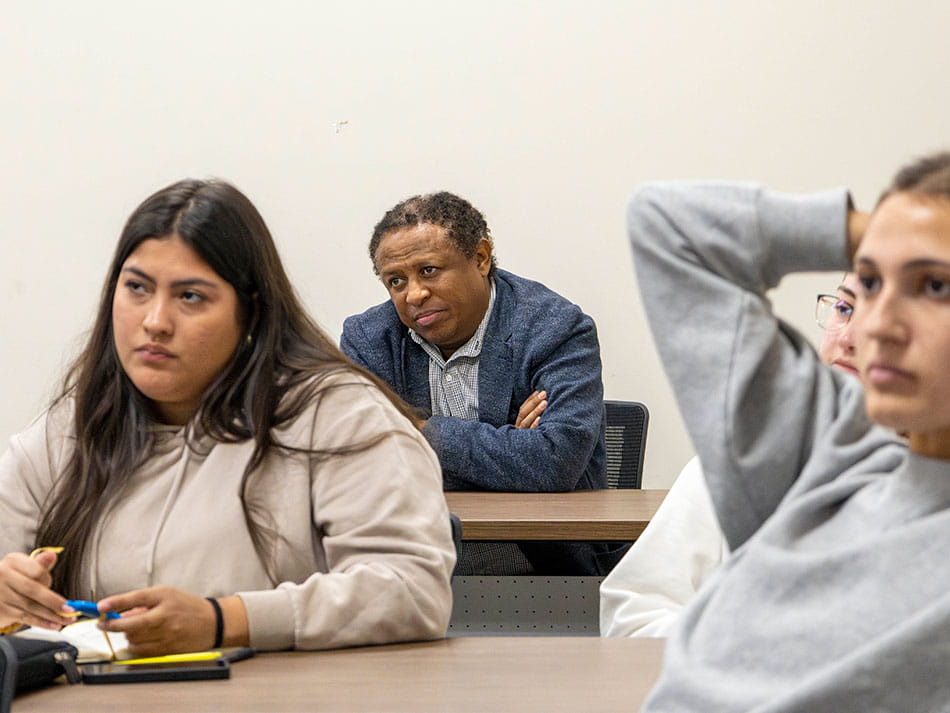“Does everyone know that there’s nothing in the Constitution that gives you any say in the presidential election?” asked New York Times Editorial Board member Jesse Wegman.
A classroom filled with Endicott students and community members tuning in online nodded.
Wegman continued: “The way you have it is through your state legislatures, which have decided to count the popular vote in your state and then award a winner-takes-all.”
Wegman Zoomed into the Nest from Burlington, Vt., to offer an analysis of the Presidential election and its aftermath on November 18.

The event was part of Join the Conversation: Endicott’s Series on Civics and took place during a class session of The 2024 US Presidential Election Seminar. Co-taught by Michael Kilburn, a professor of Politics and International Studies, and Ken Riaf, an adjunct faculty member and practicing attorney, IDS 201 examines the U.S. electoral system in real-time through analysis and election simulations.
Kilburn said that in addition to studying the Constitution at the beginning of the semester, the class has been actively examining and debating the electoral college system and its limitations.
Wegman, who has worked as a reporter, editor, and producer for multiple outlets covering election after election, is a savvy expert on the U.S. Supreme Court, electoral reform, and national politics. He is widely known for penning opinions on these topics.
His legal background informs all of his work. Wegman started as a reporter for National Public Radio before attending law school at New York University.
After a short-lived career in the law, Wegman returned to journalism in 2007 as Managing Editor of the New York Observer. Then, a Soros Justice Media Fellowship gave him the time and funding to write a book about jailhouse lawyers and prisoners who use their time in prison to teach themselves the law and argue for their release and the release of their fellow inmates. Stints at Thomson Reuters and the Newsweek Daily Beast Company ultimately led him to the New York Times.
Leaning forward in his Zoom rectangle, Wegman observed: “There is a long track record of what campaigns need to do to succeed. The Harris campaign followed that to a T, and many people have said it was the best-run campaign they’ve ever seen.”

Harris lost to Donald J. Trump, and though ballots are still being counted, “[her campaign] should call into question a lot of the assumptions that we all have about how campaigns work and what succeeds and what doesn’t,” Wegman said.
That’s when he began to dive deep into “the problem” of the electoral college system and why, in his opinion, it doesn’t serve Americans.
His 2020 book, Let the People Pick the President: The Case for Abolishing the Electoral College, was as relevant to the last election as it was to this one. Wegman believes that a presidential candidate should win not because they win the electoral college but because they win the people’s popular vote.
The electoral college system motivates candidates to focus almost exclusively on courting votes from five to seven swing states. “The candidates don’t care, the campaigns don’t care, the news media don’t care. Nobody cares about [the other] 40 to 45 states—and that has real policy implications,” Wegman argued.
That’s because presidents’ policies pander to the swing states regardless of their party affiliations. Here, Wegman pointed to one of Barack Obama’s first significant policies in 2009: the auto bailout to reinvigorate the Rust Belt, or the swing states of Michigan and Ohio. Across the aisle, Trump’s 2018 steel tariffs helped workers in the swing state of Pennsylvania.
The electoral college also plays out in decision-making. “Trump withheld federally-controlled disaster relief from California because it’s a blue state,” Wegman explained, with the thinking that voters wouldn’t elect him either way so there was little incentive for him to spend from his budget. “It’s that kind of perverse incentive to help states that will give you their electoral votes.”

Kilburn and Riaf’s students were just sixth-graders during the 2016 race. Some voted for a U.S. president for the first time in the November election. “If you look through history, both parties have suffered as a result of the way the electoral college operates,” Wegman explained.
In his book and his lecture, he advocated for a bigger House of Representatives with proportional representation synced to the growing populations of each state.
At the end of the talk, students eagerly asked Wegman questions about his work as a journalist and his personal take on the election.
Wegman, in return, asked the Gen Z students, “Tell me, how do you consume media? What’s your media diet?”
It was a candid exchange and just the kind of experiential learning session with an expert that makes Endicott’s classes so impactful.


